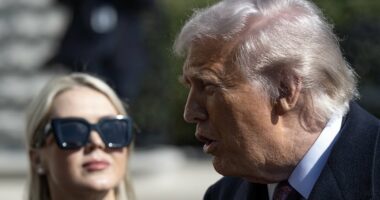Share this @internewscast.com
The International Monetary Fund (IMF) has released its latest evaluation of Australia’s economy, a report that the government is presenting as a positive endorsement.
While the IMF—a United Nations agency focused on global financial stability—commends the Labor government for steering the nation clear of a recession, this approval is not the report’s central theme.
The core of the IMF’s analysis concerns future challenges, and it expresses significant concerns about Australia’s financial outlook.
According to the IMF, Australia’s current financial structure is ill-equipped to handle an aging population, expansive spending obligations, and a limited tax base.
The report highlights that expenditures on the National Disability Insurance Scheme (NDIS) and aged care, alongside commitments in health, defense, and interest payments on a trillion-dollar government debt, cannot continue to expand at their current rate.
The IMF suggests that if the Labor government intends to maintain these spending programs, it must overhaul the tax system to reduce reliance on income taxes, which are among the highest globally.
Our reliance on income taxes over other forms of taxation concentrates our tax system in a way few other nations do, and the IMF is calling it out.
Its prescriptions for fixing the system are hardly radical in policy terms: Shift the tax mix away from direct to indirect taxes – that means increasing the GST and broadening its base. Two things Labor has ruled out doing.

This report from the International Monetary Fund comes as Australian workers grapple with high prices at the checkout

The Aussie economy is too reliant on individual income tax — but there is almost no evidence the Albanese government is prepared to do what the IMF is suggesting
The IMF also wants policy makers to revisit a resource rent tax so that mining profits on finite commodities deliver a durable public return.
It also wants concessions and exemptions that distort decisions about work, saving and investments to be wound back, alongside productivity enhancing moves such as replacing stamp duty with land taxes, in order to encourage mobility and downsizing.
On paper, a Labor government should be well placed to prosecute that IMF agenda. It wraps itself in the language of intergenerational fairness and the social compact, which are outcomes of many of the IMF’s suggestions.
It’s also up against a dysfunctional opposition that appears incapable of challenging the government right now, meaning that difficult reforms are less likely to be successfully challenged via a scare campaign.
If any government had political cover to level with voters about the structural problems in the budget right now it’s Labor. Yet there is almost no evidence the Albanese government is prepared to do what the IMF is actually urging.
On GST, the excuses are familiar. It’s a state tax. There’s no agreement. Maybe some future summit will look at it. In reality, nothing happens without prime ministerial ownership and a treasurer willing to spend political capital and mount a difficult argument.
Neither Albo nor Jim Chalmers look remotely interested in doing so on tax and spending reforms.
On a mining tax, the scars of the Rudd and Gillard experiences still define Labor’s instincts.

Voters have been left wholly unprepared for the economic trade offs that will eventually be forced on them

If such wilful blindness continues, Paul Keating’s 1980s warning that without reforms Australia risks becoming a banana republic will once again loom large
Given the chance to design a durable rent tax and lock in revenue while commodity prices remain favourable, the government prefers not to relive an old internal trauma.
Chalmers watched the mining tax his old boss Wayne Swan rolled out collapse around him. He won’t want to suffer a similar fate, if the Coalition ever got its act together to challenge the premise.
The same pattern of doing nothing meaningful applies on the spending side.
Ministers talk about cracking down on NDIS rorts, tightening eligibility at the margins and improving aged care regulation. But the public facing message is almost always expansion and enhancement: more places, more rights, more money.
That might be politically convenient, but it leaves voters wholly unprepared for the trade offs that will eventually be forced on them, which is precisely the warning the IMF is issuing.
Of course Chalmers appears to have convinced himself he’s already carrying out the sorts of reforms the IMF wants. But rearranging stage three tax cuts and rolling out modest housing schemes is not the comprehensive tax package it’s talking about. Nor is a bit of competition policy reform or the half-baked super changes Albo overruled Chalmers on.
These ‘reforms’ barely address the big structural concerns the IMF cites. The pressures are compounding and the solutions are well known, however Labor is behaving as if the reckoning can be put off indefinitely. Meanwhile the Coalition are turning themselves inside out debating an emissions target for 25 years from now.
Labor likes to talk about itself as the party of reform. In the Hawke and Keating era that meant something substantive. Today ‘reform’ has been reduced to re-profiling tax cuts and announcing reviews. The IMF’s wish list has effectively given the government cover to tell the truth about the tax base and the sustainability of current spending.
So far, however, Albo and Chalmers have preferred to cherry-pick the compliments in the IMF report and ignore the prescription medicine recommended. If such wilful blindness continues, Paul Keating’s 1980s warning that without reforms Australia risks becoming a banana republic will once again loom large.
















